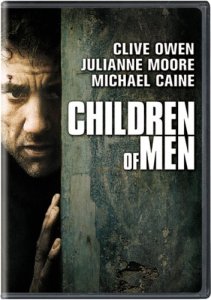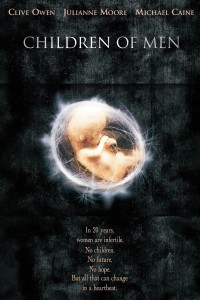We all have our favorite Christmas films, the ones that stir good cheer and remind us of family and home. But what of Advent, the season that culminates in that celebration? What films capture the painful waiting, struggle for peace, and desperation for change that often accompany this period before the joy?
Alfonso Cuarón’s violent, R-rated Children of Men (2006) is one such Advent parable. It may wear the tatters of a grim, hopeless tale, but via its premise, oppressive setting, and ironic use of the name Jesus, it poses an important Advent question: for people of faith, what form should waiting take?
In 2027, the world has become infertile. In the last city standing – London — bombs shatter peace, immigrants are caged, and militarized police oppress citizens. As the movie opens, the youngest human (18 years) dies, plunging the populace into deeper despair. There are rebels willing to die for change, but the main character, Theo Faron (Clive Owen), isn’t one of them. Divorced with tragic loss in his past, he wants his morning coffee and no trouble. Then a bomb blows up his coffee shop and he gets kidnapped by terrorists who want his help in escorting an immigrant out of the country.
Even though his name means “God”, Theo has lost his faith. Now, he faces the dilemma that Greg Russinger, the leader of Portland Foursquare, spoke of in a recent Gathering. “To be a peacemaker is arduous and takes facing ourselves – not detaching, but entering, struggling, opposing…”
It is a question he must face — how shall he live in an Advent world desperate for Christmas? Does he risk his own life to help the cause of peace? Does he join a fight with no guaranteed victory?
Perhaps the premise and plot make it no surprise that author P.D. James described her original novel as a ‘Christian fable.’ Or that writer/director Cuarón described the film as “…almost like a look at Christianity.” “I didn’t want to shy away from the spiritual archetypes,” Cuarón told Filmmaker Magazine. “But I wasn’t interested in dealing with dogma.”
Instead, Cuarón deals with Christianity more directly through the ironic use of Jesus’ name. Three separate times, characters speak Jesus’ name in utterances that sound much closer to profanity than profession.
The first time, a man screams out “Jesus Christ!” as bullets pierce his car and blood soaks the shirt of his friend, who’s also their leader and hope for the future. Wrenched from him, his Advent anguish calls out the name that once saved the world. Perhaps he intends it as profane. But can’t you also hear the groan of creation? The cry of a world wanting and waiting? The cry of all of us when we feel abandoned?
The second time, Theo whispers ‘Jesus Christ’ as he comes face to face with a barn miracle. He sounds like he’s been punched. What he has just witnessed could change everything and demands his response. Will Theo remain the same now that he’s seen this miracle? Can he still seek his own good above others?
Finally, and perhaps most tellingly, Cuarón gives Jesus the last word of the film when a weary, wounded Theo exhales ‘Oh, Jesus.” In this groan, we hear a disciple who — having endured, battled, and extended himself far beyond what he thought possible – may have found his faith again. At the end, without any guarantees his mission will be successful, Theo’s cry might be profanity. But it could also be profession.
For those sensitive to violence and grim situations, Children of Men might be rough. But so were the days of Jesus. And so are our days now. This hardship shapes an important Advent question. How shall we wait? Will we seek comfort or peace? Risk others or ourselves?
I pray this film speaks to all Advent struggles, helping us forge ahead to make peace and celebrate the true Christmas.


Rick, I’ve not seen this film nor am I likely to do so. Not my cup of tea for several reasons. However, I do like the kind of film that opens one’s eyes to questions of faith and the human condition. On occasion I will brave the “content” of an R-rated film and join others for a viewing simply for the possibility of discussion. “Blade Runner” was the first R film that spoke to me in parable. The last one I viewed was “The Matrix” (series) for that purpose. Engaging culture is not always “safe” or comfortable, but Jesus calls us to be IN the world and not OF it. The balance is an individual calling. Thanks for sharing.
Thank you for the comments, Gregory. I’m glad to find another believer in the parabolic potential of film. The Matrix trilogy is astounding spiritually-speaking. So is the recent Interstellar. I look forward to ‘snowballing’ religious ruminations across UpperleftEdge with you.